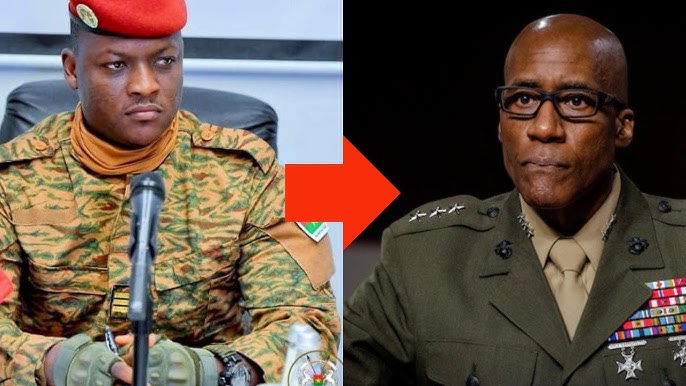**Headline: General Michael Langley’s Kenya Visit Sparks Backlash: Is He the New Face of Colonialism?**

In a whirlwind of controversy, General Michael Langley, Commander of U.S. Africom, has found himself at the center of a growing storm after disparaging remarks about Burkina Faso’s President Ibrahim Traoré ignited outrage across the continent. During a recent visit to Kenya for the annual African Chiefs of Defense Conference, Langley attempted to clarify his earlier accusations, but the damage may already be done.
Just weeks prior, Langley accused Traoré of exploiting Burkina Faso’s gold reserves for personal protection—a statement that resonated deeply with pan-Africanists and sparked intense backlash. His words were seen as not just an attack on Traoré’s leadership but also as a broader commentary on Africa’s struggle for autonomy in the face of Western influence. The outrage was palpable, and many Africans have branded him public enemy number one.

Now, as Langley attends the defense conference, he is faced with the daunting task of mending fences. In a private interview following the event, he attempted to walk back his incendiary comments, claiming they were misconstrued and merely reflected military concerns over the escalating terrorist threats in Burkina Faso. However, critics argue that his explanations come off as insincere and evasive, questioning how a negative remark about a sovereign nation could ever stem from a place of genuine concern.
The backdrop of Langley’s visit raises significant questions about the nature of U.S.-African relations. The fact that a foreign general is spearheading discussions on African security is emblematic of a troubling dynamic that many believe undermines the continent’s capacity to solve its own issues. Langley’s presence at the conference, organized by Africom, has led to accusations that the U.S. is attempting to reassert its influence over African military affairs, especially in light of recent shifts in power dynamics across the continent.
A crucial point of contention is the U.S. military’s track record in Africa. Since Africom’s inception in 2007, terrorism and instability have surged rather than diminished. Critics are quick to point out that Langley, while voicing opinions on Burkina Faso’s military readiness, operates from a safe distance, far removed from the realities faced by African nations.

Langley’s statements reflect a broader Western narrative that many African leaders and citizens find deeply patronizing. The notion that Africa requires external guidance to combat its security challenges is increasingly being challenged by a new wave of leaders, including Traoré, who prioritize self-sufficiency and independence. The question looms large: when will African nations stop relying on Western powers for solutions to their own problems?
In light of Langley’s comments and the subsequent backlash, the focus on the African Chiefs of Defense Conference has shifted from its intended purpose of fostering military collaboration to a critical examination of the very foundations of U.S.-African partnerships. The ongoing debate highlights a crucial turning point in how African nations might redefine their relationships with foreign powers and reclaim their narratives.
As the dust settles from Langley’s visit, the question remains—will Africa continue to play the role of an unwilling participant in the geopolitical chess game, or will it seize the opportunity to assert its sovereignty and chart its own course? The answer may very well shape the future of U.S.-African relations and the continent’s journey toward self-determination.